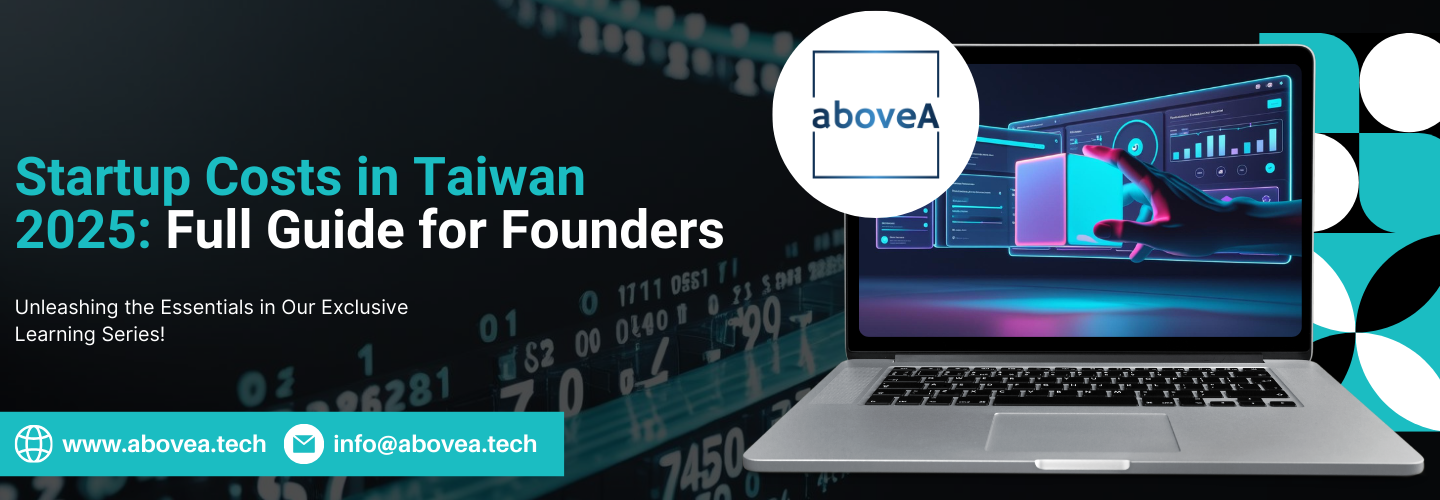

Austeja Norvaisaite
Growth hacker and strategic partnership coordinator. Passionate about blending creativity with data-driven insights to craft accessible, resonant content for diverse audiences.
How Much Does It Cost to Build a Startup in Taiwan in 2025?
- Last Time Updated: 24th of January, 2026
Starting a startup in Taiwan in 2025 means understanding both legal and practical costs. You’ll want to know how much it costs to register your company, open a bank account, hire staff, pay for services, and get the business running. This article breaks down the real expenses from registration fees and notary services to accountant costs, office rent, and mandatory contributions like insurance and social security.
We’ll show you what to budget so your startup can grow smoothly in cities like Taipei, Taichung, or Kaohsiung. You’ll learn how to plan your finances wisely, avoid surprises, and focus on building your business successfully.
Lower startup costs, higher growth - let aboveA guide your expansion.
Table of Contents
Company Registration Fees and Processes
The first step in building a startup in Taiwan is legal registration. Without completing this step, you cannot open a business bank account, hire staff legally, or issue invoices to customers. In 2025, Taiwan continues to make the process relatively affordable compared to other Asian hubs, though costs vary depending on the type of company you choose.
Most foreign and local entrepreneurs register a limited liability company. The official filing fee at the Ministry of Economic Affairs is usually between NT$1,000 and NT$2,000 (about US$30–65). If you use an online system, the cost may be slightly lower. However, most founders also work with local agencies or accounting firms who handle paperwork, notary requirements, and translations. These service fees typically range from NT$10,000 to NT$25,000 (US$320–800), depending on the complexity of the business structure and whether you need bilingual support.
Another important factor is minimum capital requirements. Taiwan has mostly removed strict capital rules, but practical expectations remain. For a small service-based startup, declaring NT$50,000 (around US$1,600) is common, while tech companies or businesses applying for visas may need to show higher amounts, often NT$500,000 or more. This is not money you lose; it stays in your company account and can be used for operations.
Once registered, you’ll also need a company seal (chop), which costs NT$1,000–3,000 (US$30–100). This is a legal stamp required to sign official documents. Additionally, all new businesses must apply for tax registration with the National Taxation Bureau. This step is free but may involve accountant service charges.
Overall, most startups spend NT$60,000–100,000 (US$2,000–3,300) in total during the registration stage, covering fees, capital, legal services, and basic compliance. For international founders, costs may lean toward the higher end due to translation and visa requirements.
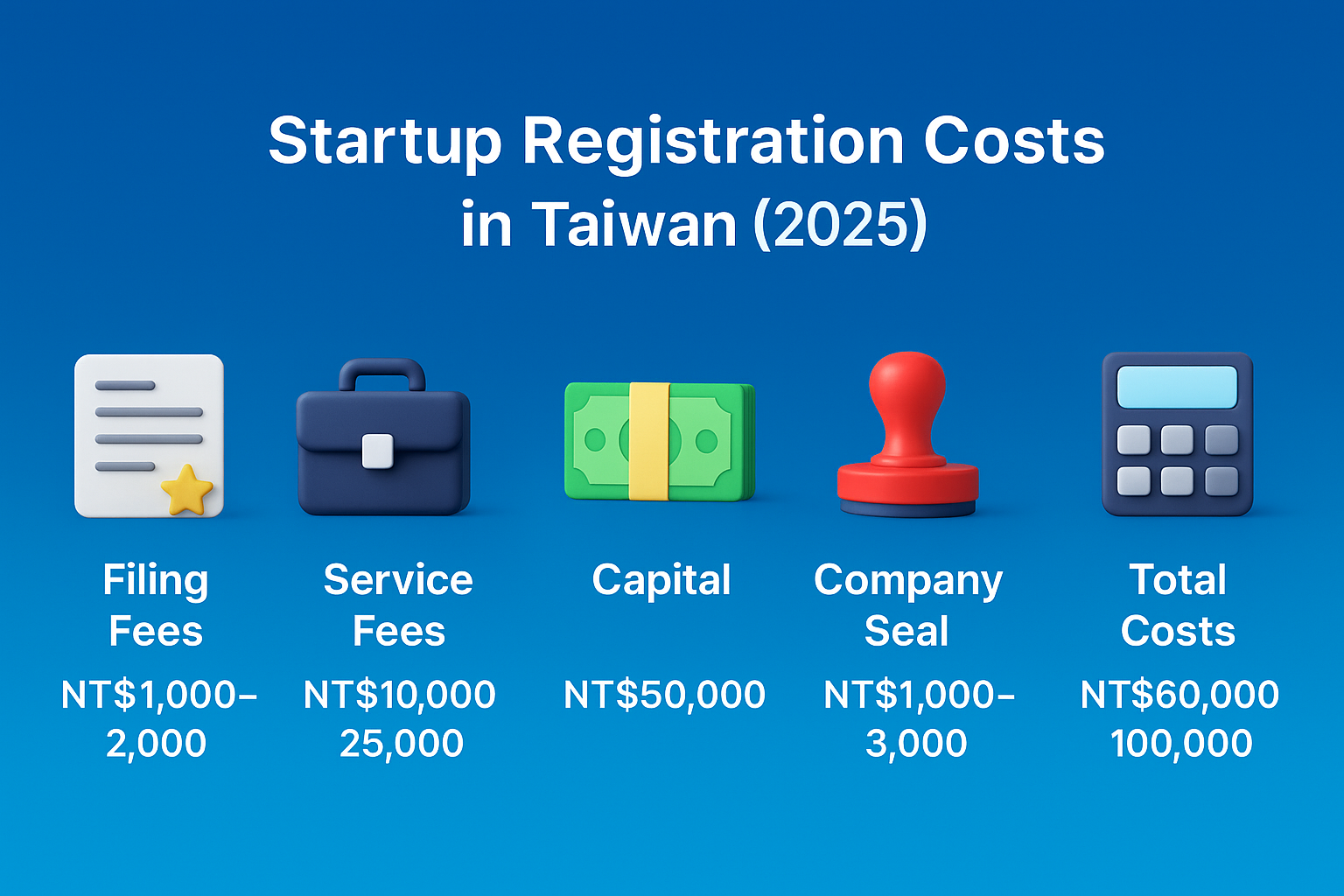
Office Space and Co-Working Costs
After registration, the next major cost for startups in Taiwan is finding a place to work. In 2025, founders have more options than ever. You can rent a traditional office, choose a co-working space, or even register the company at a virtual office. Each option comes with different price levels, flexibility, and legal considerations.
Traditional Offices vs. Co-Working Spaces
Traditional office rent in Taiwan depends on the city. In Taipei, which remains the main startup hub, prime office space in central areas like Xinyi District can cost NT$2,000–3,500 per ping per month (a ping equals 3.3 square meters). This translates to around NT$60,000–100,000 (US$2,000–3,300) monthly for a small 20-ping office. Cities like Taichung or Kaohsiung are more affordable, with prices often 30–40% lower. Traditional offices also require deposits of two or three months’ rent plus renovation costs, which can significantly raise initial expenses.
For many startups, co-working spaces offer a better balance of cost and flexibility. In Taipei, popular co-working providers like WeWork, Futureward, and CLBC charge NT$6,000–12,000 (US$200–400) per desk per month, often including internet, utilities, and meeting room access. Private team offices inside co-working hubs can range from NT$30,000 to NT$80,000 per month depending on size and location. These spaces also create opportunities for networking, partnerships, and exposure to Taiwan’s startup ecosystem.
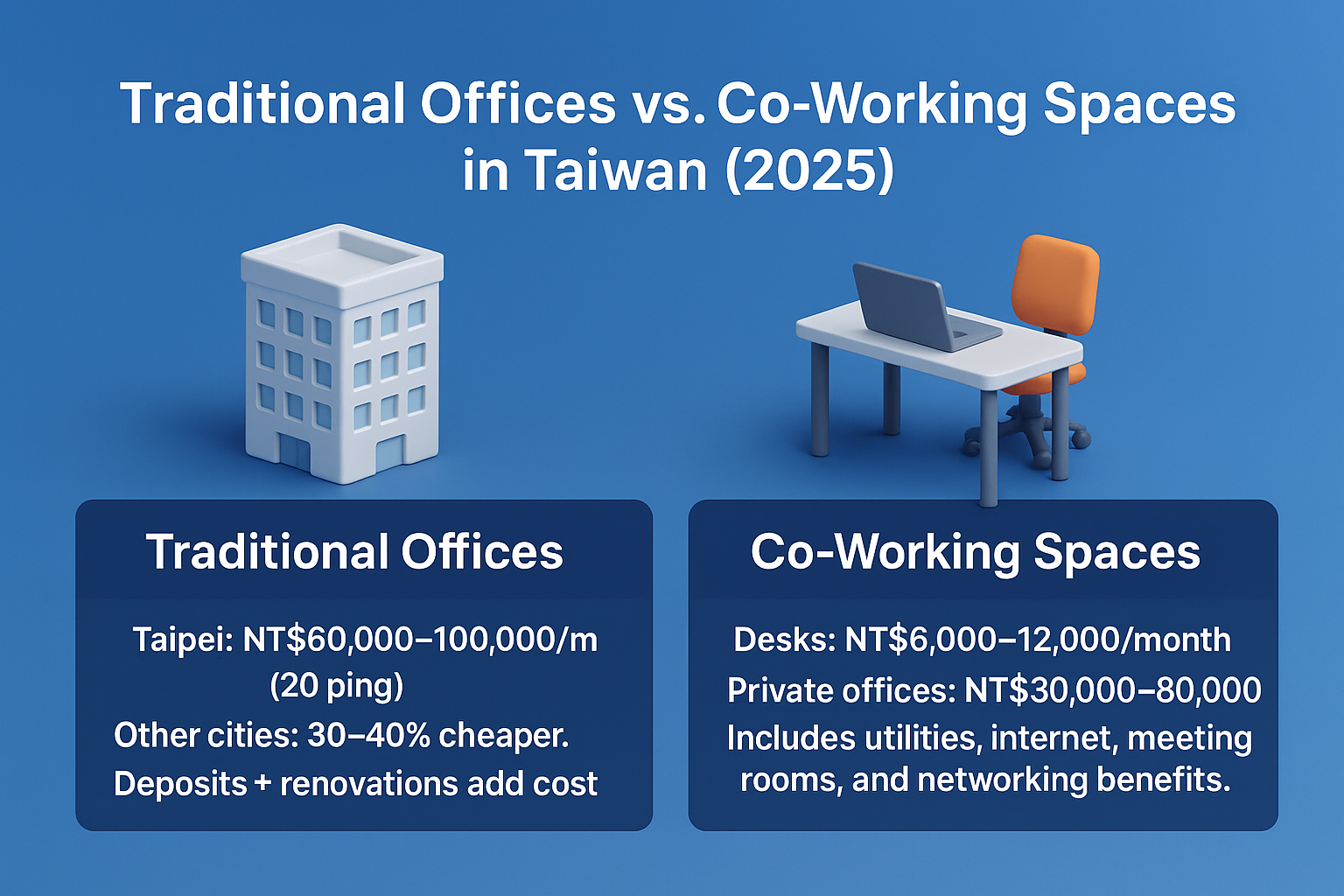
Virtual Offices as a Low-Cost Option
Another growing option is the virtual office. For startups that don’t need daily physical space, registering an address with a virtual office provider costs around NT$3,000–6,000 (US$100–200) per month. This satisfies Taiwan’s legal requirement for a registered address while keeping costs very low. Many founders combine a virtual office with remote work or occasional co-working usage.
Overall, startups in Taiwan can budget anywhere from NT$3,000 per month for a virtual address to over NT$100,000 for prime offices in Taipei. Choosing the right option depends on whether you need prestige, daily work space, or just a legal registration.
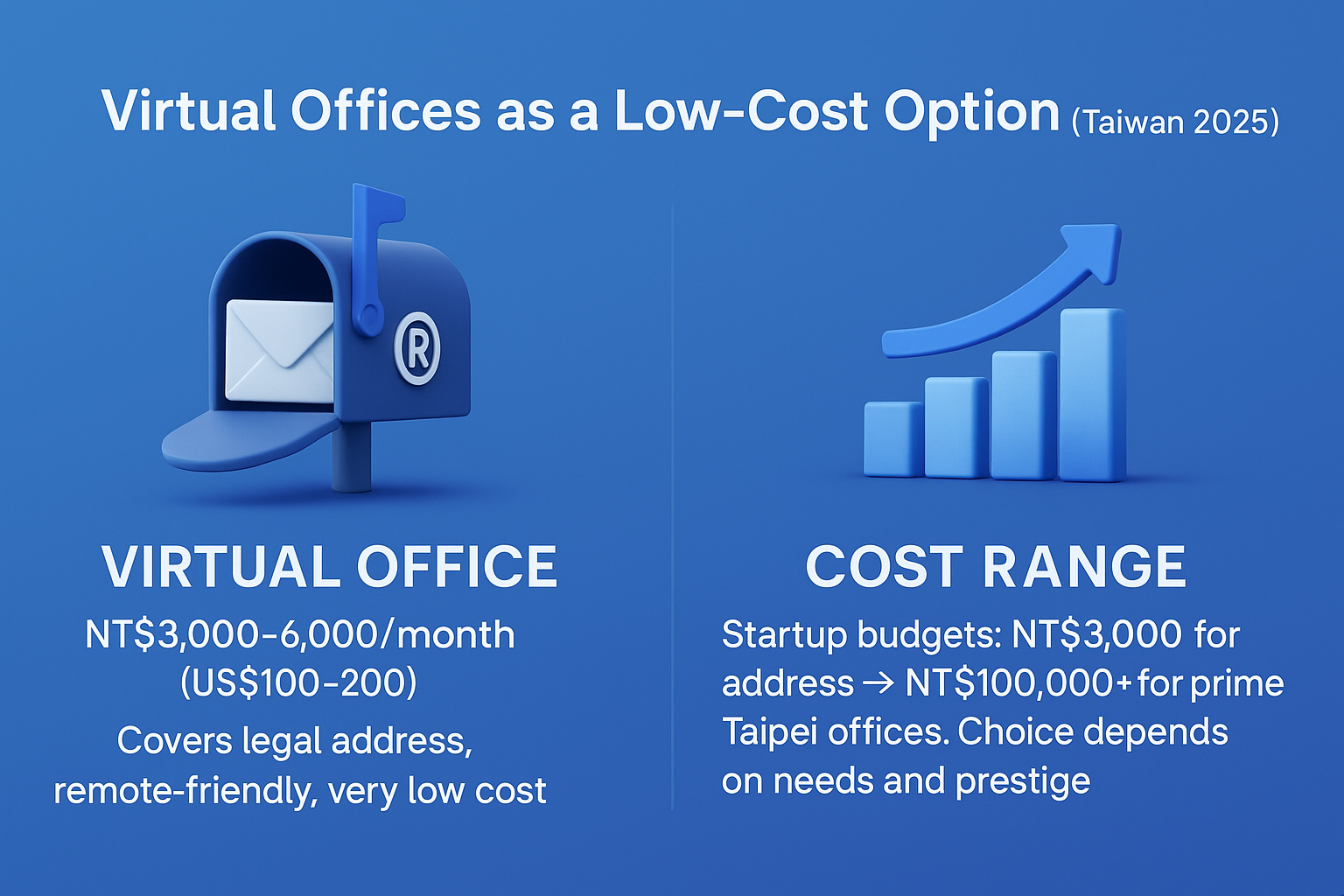
Hiring and Salary Costs for Startups
People are often the most significant expense for startups in Taiwan. By 2025, salaries, benefits, and mandatory contributions will continue to be substantial parts of the budget. Hiring costs vary depending on the industry, skill level, and whether you employ local talent or foreign workers.
Average Salary Levels in Taiwan
In 2025, the monthly minimum wage in Taiwan is NT$27,470 (about US$880). For startups, most employees earn more than this depending on their role. Entry-level staff in customer service or administration typically earn NT$30,000–40,000 per month (US$960–1,300). Skilled professionals in areas like marketing, software development, or design usually make NT$45,000–70,000 (US$1,440–2,250). Senior engineers, project managers, or finance specialists may expect NT$80,000–120,000 (US$2,600–3,900). In Taipei, salaries tend to be higher than in Taichung or Kaohsiung, but the differences are smaller than in other Asian countries.
For foreign hires, salaries may need to be higher if you are applying for work permits or residency visas. The Ministry of Labor often requires proof that a foreign professional is being paid at a competitive level, usually above NT$47,971 (US$1,550) per month.
Benefits, Insurance, and Extra Costs
Beyond salaries, Taiwan law requires contributions to Labor Insurance, Health Insurance, and Pension Funds. Employers must cover part of these costs, which generally add 10–15% to the salary budget. For example, an employee making NT$50,000 per month may cost the company an additional NT$5,000–7,500 once contributions are included.
Recruitment also carries costs. Posting on local job boards such as 104.com.tw or using recruitment agencies can range from NT$5,000 per listing to tens of thousands for headhunting services. Many startups reduce costs by relying on LinkedIn or startup communities, but scaling a team usually requires formal recruitment spending.
Hiring also includes training and onboarding expenses. While often overlooked, new employees need resources, time from managers, and sometimes external workshops. These indirect costs can equal several weeks of salary during the onboarding phase.
Overall, startups in Taiwan should expect total staff expenses, including salaries, benefits, and hiring costs to account for 50–70% of monthly operating budgets. Planning ahead ensures you can attract talent without overextending your financial resources.
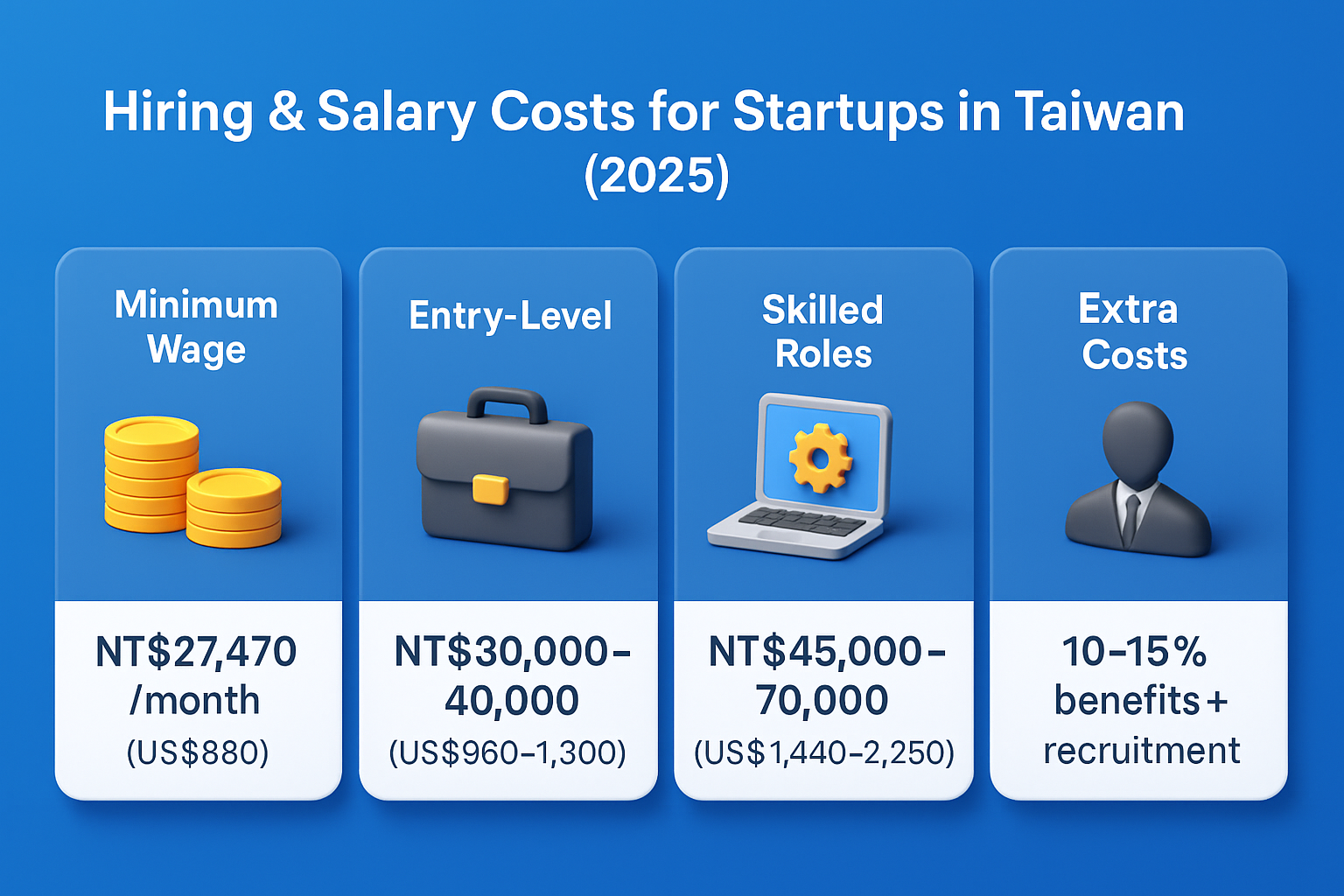
Licensing, Legal, and Compliance Costs
Beyond company registration, startups in Taiwan face additional costs tied to licenses, compliance, and ongoing legal requirements. These costs vary depending on industry, but almost every business must budget for them.
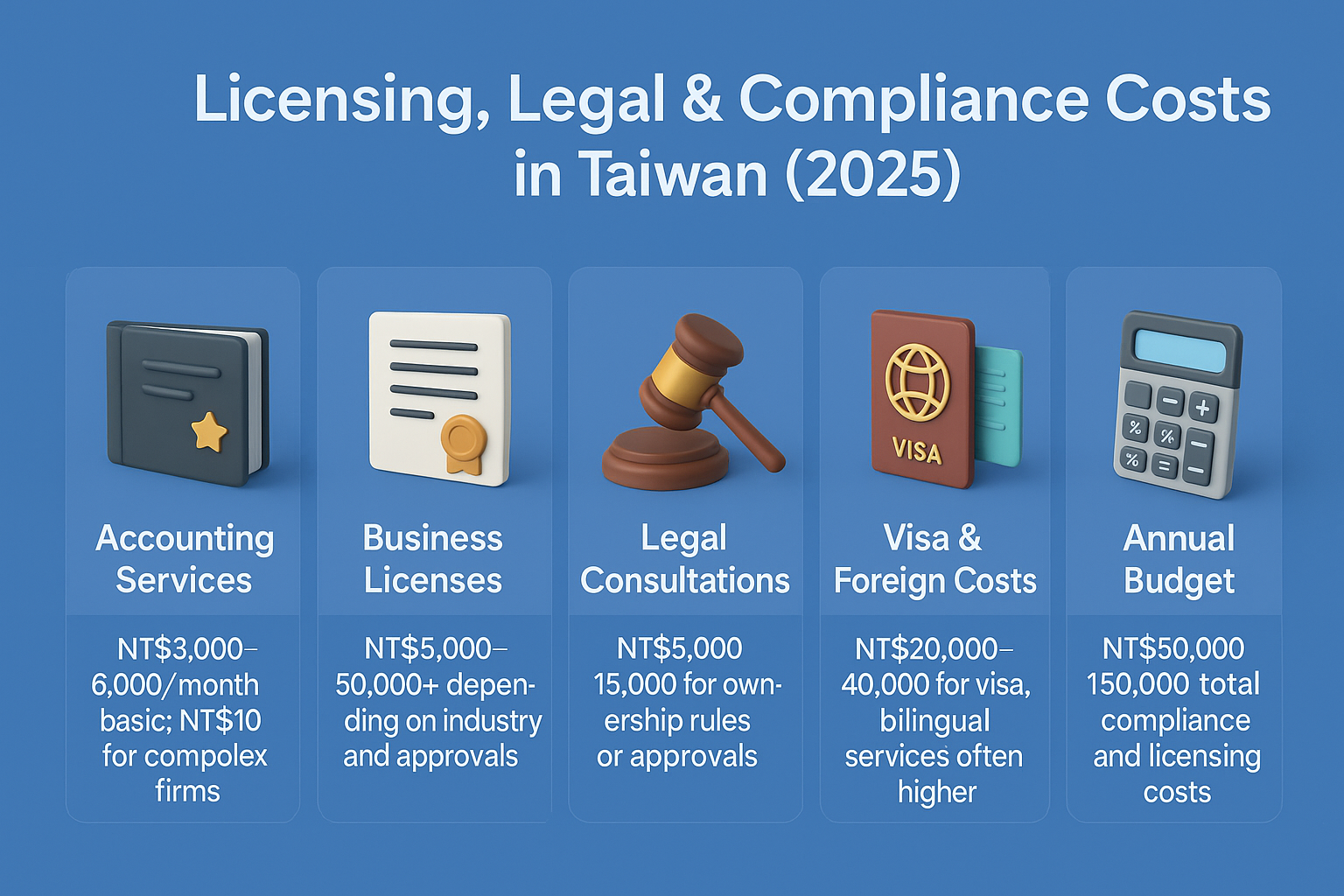
Common Legal and Compliance Expenses
Every startup must handle annual tax filings, bookkeeping, and accounting. While Taiwan does not force small companies to hire full-time accountants, most startups rely on accounting firms. Basic monthly service packages start at NT$3,000–6,000 (US$100–200), which cover bookkeeping, VAT filings, and salary tax reporting. More complex companies, especially those handling international transactions—may pay NT$10,000 or more each month.
Legal compliance also includes business licenses. For general service companies, approval comes with registration and adds little cost. However, startups in industries such as food, healthcare, education, or finance must apply for additional permits. Fees range from NT$5,000 to over NT$50,000 depending on the license type, inspections, and renewal requirements.
Another expense comes from foreign ownership rules. While Taiwan is open to foreign investment, some sectors restrict ownership percentages or require specific approvals. Legal consultations on these matters typically cost NT$5,000–15,000.
Extra Considerations for Foreign Startups
International founders often face higher compliance costs. Key areas to plan for include:
Bilingual service providers – Hiring accountants or legal advisors fluent in English may double service fees compared to local-only firms.
Visa applications – Investor visas or entrepreneur visas often involve document preparation and verification costing NT$20,000–40,000 (US$650–1,300).
Legal contracts and IP – Drafting bilingual contracts or protecting intellectual property with local lawyers can add thousands in annual costs.
Government reporting – Extra administrative work is often required to maintain updated shareholder and foreign ownership details.
In total, startups in Taiwan should budget NT$50,000–150,000 annually for legal, licensing, and compliance costs, depending on industry and ownership structure. These expenses may not feel as urgent as rent or salaries, but they protect the business from costly penalties and ensure smooth long-term growth.
Techbology Infrastructure
Technology is another core expense for startups in Taiwan. In 2025, businesses need reliable internet, cloud services, hardware, and software to operate smoothly. While Taiwan offers competitive prices compared to Singapore and Japan, budgeting for these essentials remains critical.
Core Technology Expenses
High-speed internet is affordable and widely available. A typical office connection costs NT$1,000–2,000 (US$30–65) per month. Mobile data for team members adds another NT$500–1,000 per person. Hardware expenses, such as laptops, monitors, and peripherals, depend on quality, but a complete workstation generally costs NT$30,000–50,000 (approximately US$1,000–1,600). Many startups also invest in cloud services and SaaS tools, which provide flexibility for remote or hybrid teams.
Common Tech and Infrastructure Costs
| Category | Typical Cost Range (NT$) | USD Equivalent | Notes |
|---|---|---|---|
| Internet (Office) | 1,000–2,000 / month | 30–65 | Stable fiber-optic speeds across major cities. |
| Mobile Plans | 500–1,000 / month per user | 15–30 | Unlimited data plans available for teams. |
| Workstations (Laptop + Monitor) | 30,000–50,000 per set | 1,000–1,600 | One-time purchase per employee. |
| Cloud Services (AWS, GCP, Azure) | 3,000–15,000 / month | 100–500 | Depends on scale of usage and storage needs. |
| SaaS Tools (CRM, project management, design apps) | 1,500–6,000 / month | 50–200 | Popular choices include HubSpot, Slack, Figma, Notion. |
| IT Support / Maintenance | 10,000–30,000 annually | 330–1,000 | Outsourced providers available for small startups. |
Remote Operations Considerations
Taiwan’s startup scene is increasingly adopting remote and hybrid models. Many founders run lean operations with a virtual office address, often combined with remote work, which significantly reduces office rent. In this setup, technology costs rise slightly, as more investment goes into cloud storage, collaboration tools, and cybersecurity. Businesses also budget for VPNs, secure servers, and subscription software for distributed teams.
Overall, startups should expect to spend NT$50,000–150,000 (US$1,600–5,000) annually on technology and infrastructure, depending on team size and reliance on remote systems. These investments ensure smooth communication, protect data, and support scalability as the business grows.
Marketing and Customer Acquisition Costs
Marketing is where your startup builds visibility and finds customers. In Taiwan’s competitive 2025 landscape, spending wisely on marketing determines how fast you grow – and how well you connect locally.
How Much Should You Spend?
Digital ad spending in Taiwan is booming. In 2025, the total advertising market is expected to reach approximately US $6.53 billion, with social media alone accounting for roughly US $961.6 million. For startups, a standard guideline is to allocate 8–12% of revenue to marketing, aligning with global trends where companies typically spend 9.4% of their revenue on marketing. This means a startup with NT$2 million in monthly revenue may budget around NT$160,000 to NT$240,000 (US$5,000–7,500) per month for customer acquisition.
Marketing Channels and Cost Breakdown
Here are typical channels and how they shape marketing investment:
Digital Ads & Social Media: Includes campaigns on LINE, Facebook, Instagram, and TikTok. Effective for reach and engagement across Taiwan’s 90% social-media-using population.
Content & SEO: Producing blog posts, localized landing pages, and SEO content helps your brand get found organically.
Influencer Collaborations: Local influencers and micro-creators offer powerful amplification with lower cost than traditional media.
Putting this into perspective, small campaigns, like a localized Facebook ad or content push, may cost NT$30,000–150,000 per month (US$1,000–5,000), while larger integrated campaigns with agencies can range between NT$150,000–450,000 per month (US$5,000–15,000)
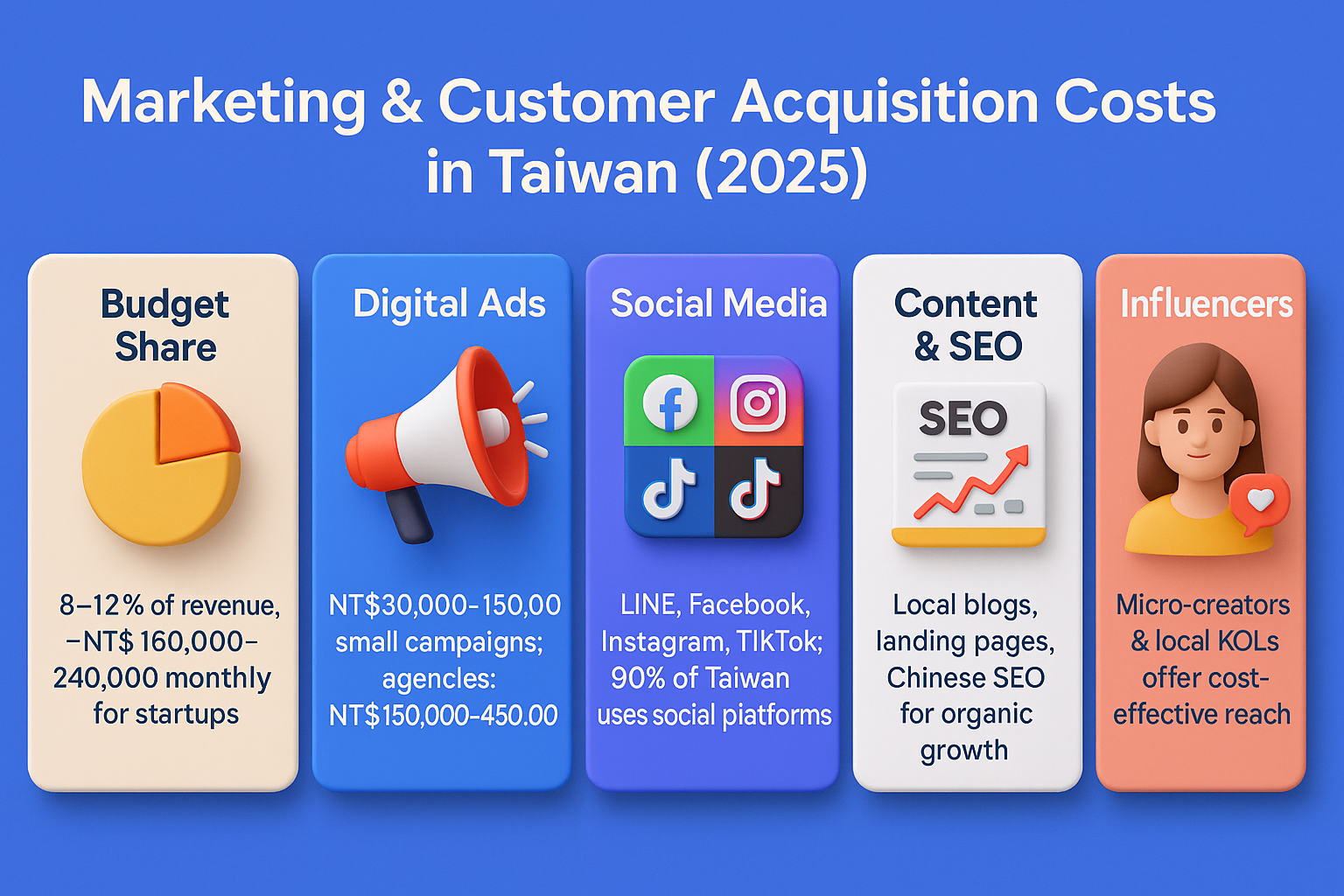
Best Practices for Efficient Budgeting
To make your marketing budget go further, consider these tips:
- Focus first on high-impact digital channels, such as LINE, which reaches 95% of Taiwanese users, and mobile video platforms, which are experiencing rapid growth.
- Localize every campaign with traditional Chinese content, adapting tone and visuals to match cultural norms, trends, and holidays.
- Regularly track ROI, cost-per-click, conversions, and engagement. Tools like Google Analytics, Facebook Ads Manager, and the dashboards of local platforms are critical.
In Taiwan’s vibrant digital market, marketing and customer acquisition require both smart budgeting and cultural insight. Plan for a solid monthly marketing budget based on revenue, lean into digital-first platforms (especially those with high local usage like LINE), and let data guide your investments for the best return.
Financial Planning and Funding Options
For startups in Taiwan, financial planning is not only about controlling costs; it’s also about finding the right funding sources to sustain growth. In 2025, Taiwan’s ecosystem offers diverse funding paths, but competition for resources is intense.
Building a Financial Plan
A proper financial plan must balance early expenses, break-even timelines, and projected growth. Startups typically plan for 12–18 months of runway to cover salaries, office expenses, and marketing costs. This means calculating expected revenue against the monthly burn rate. For example, if your team spends NT$800,000 per month, you should secure at least NT$9.6 million in funding to operate for a year.
Taiwanese banks are cautious with lending to new ventures, so most founders rely on a mix of equity financing, government support, and personal investment.
Funding Sources in Taiwan
Taiwan’s startup ecosystem has matured, with more capital available than five years ago. Key funding options include:
Government Grants and Programs: Taiwan Startup Terrace, Small and Medium Enterprise Administration (SMEA), and the National Development Fund offer grants, subsidies, and incubation support. Programs like the Taiwan Tech Arena (TTA) continue to attract foreign and local founders (Invest Taiwan).
Venture Capital: According to Taiwania Capital, venture investments in Taiwan reached nearly US$2.4 billion in 2024, with growth expected through 2025, especially in biotech, AI, and green energy (Taiwania Capital News).
Angel Investors: Local angel networks focus on early-stage tech and consumer goods.
Crowdfunding Platforms: FlyingV and Zeczec remain popular for creative, hardware, and consumer-facing startups, allowing pre-sales and validation before larger fundraising.
Strategic Considerations
Financial planning in Taiwan should also account for:
Exchange rate risks if revenue is earned abroad.
Subsidies for R&D, which can reduce tech startup costs significantly.
Corporate partnerships, where large Taiwanese manufacturers or tech firms invest in or mentor startups to secure innovation pipelines.
Final Thought
Startups that succeed financially are those that treat fundraising as a continuous process, not a one-time event. By aligning burn rate with realistic revenue goals and tapping into Taiwan’s government and private funding channels, founders can secure the capital needed for both survival and growth.
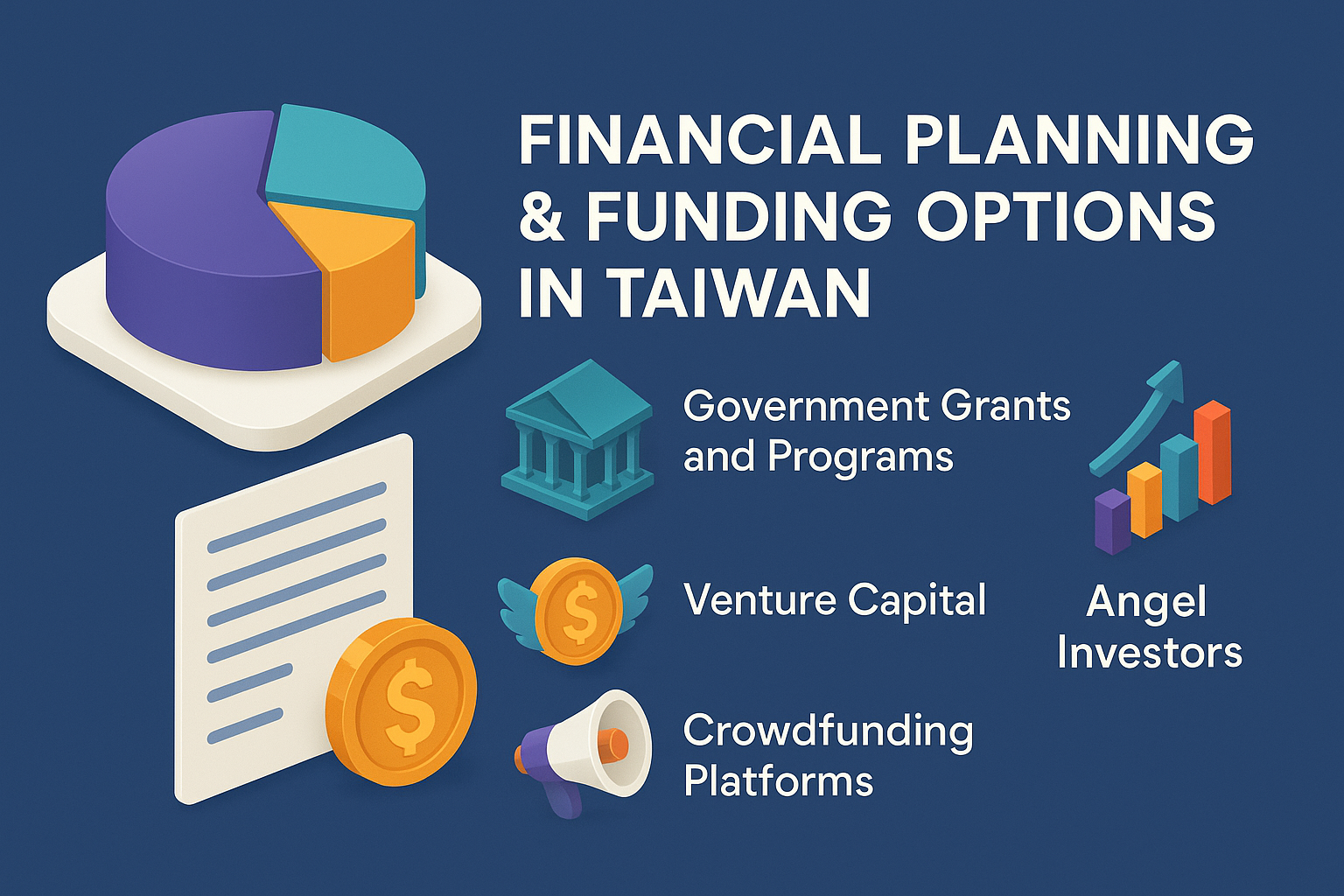
Cost Comparison – Taiwan vs Other Asian Hubs
Entrepreneurs often compare Taiwan with other regional hubs, such as Singapore, Hong Kong, and South Korea. Each market offers unique strengths, but cost differences remain a key factor in decision-making for founders in 2025.
Taiwan vs. Other Startup Hubs
The table below highlights typical 2025 startup costs in Taiwan, compared with those in Singapore, Hong Kong, and South Korea. It covers office rent, salaries, registration, marketing, and ease of entry.
| Category | Taiwan | Singapore | Hong Kong | South Korea |
|---|---|---|---|---|
| Office Rent (US$/sq ft annually) | 18–25 (Taipei) | 60–70 (Central) | 90+ (Central) | 30–40 (Seoul) |
| Average Tech Salary (US$/month) | 2,200–2,800 | 4,500+ | 3,800–4,200 | 3,200–3,800 |
| Company Registration (US$) | 320–800 | 800–1,500 | 1,200–2,000 | 700–1,200 |
| Marketing Spend (monthly, US$) | 1,000–7,500 | 5,000–15,000 | 6,000–18,000 | 2,500–10,000 |
| Ease of Foreign Entry | High (supportive grants, incubators) | Very High (investor hub) | Moderate (regulatory complexity) | Moderate (cultural/regulatory hurdles) |
What the Numbers Show?
The comparison makes clear why Taiwan is attracting founders. Office space in Taipei is two to four times cheaper than in Singapore or Hong Kong, while salaries remain competitive yet more affordable than Seoul. Registration fees are lower than most hubs, and monthly marketing campaigns can be run at one-third the price of Hong Kong. Foreign entry is smoother thanks to government grants, startup incubators, and bilingual business support programs.
Together, these factors show Taiwan’s unique position: affordable enough for early-stage ventures, but sophisticated enough to support scaling. For founders seeking a balance of cost-efficiency and market access, Taiwan is one of Asia’s most strategic choices in 2025.
How aboveA Supports Startups in Taiwan?
Launching a startup in Taiwan requires more than just budgeting for offices, salaries, and licenses. Success depends on building visibility, gaining customers, and scaling operations across multiple cities or even globally. That’s where aboveA comes in.
Local SEO and Market Entry
aboveA helps startups get discovered faster with local SEO strategies designed for Taiwan’s search market. From optimizing Google Business Profiles in Mandarin to building city-specific landing pages, our team ensures your business appears when customers search. For founders planning international expansion, we also create scalable SEO systems that adapt to markets beyond Taiwan.
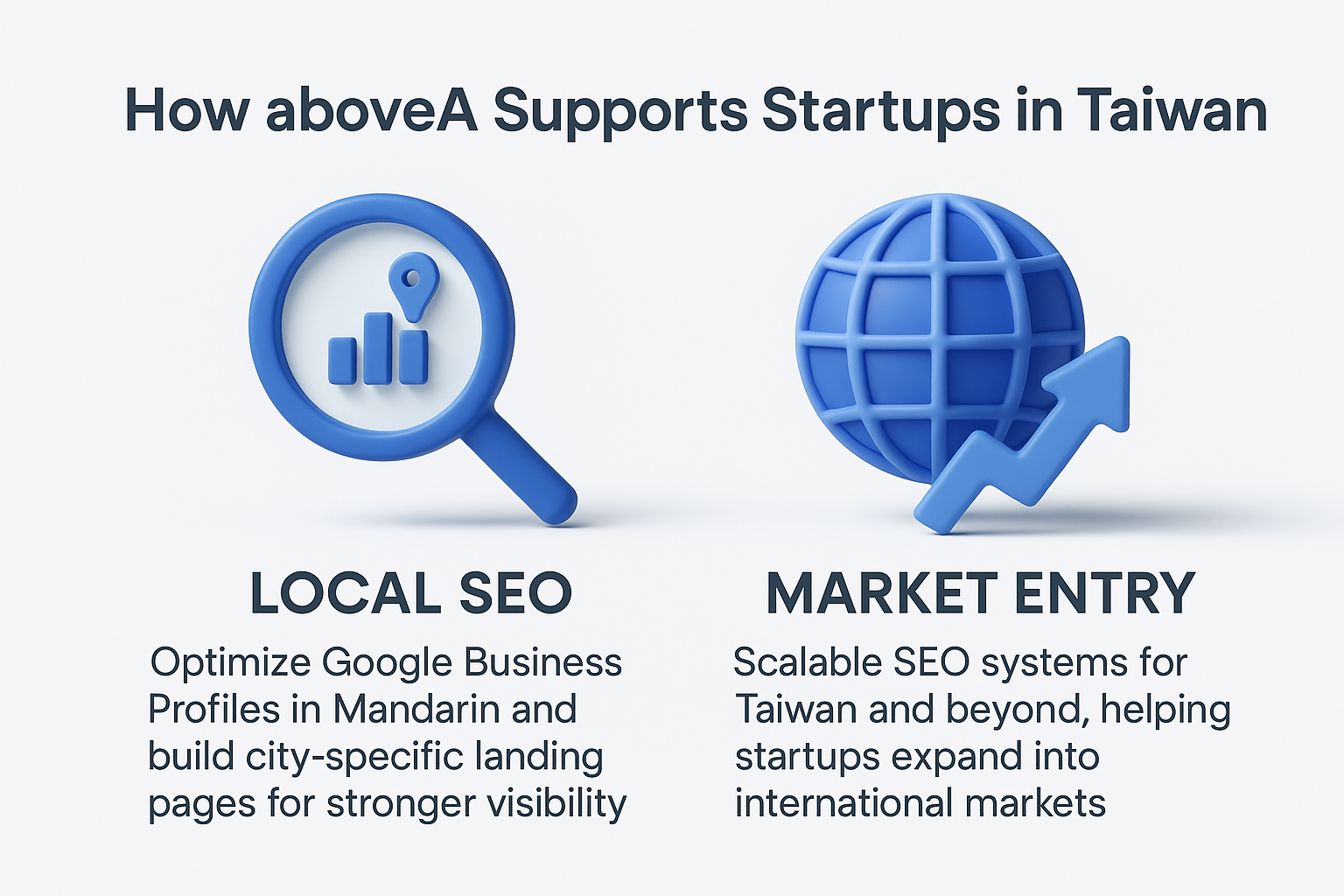
Growth Marketing and Lead Generation
We design data-driven marketing campaigns tailored for Taiwan’s digital landscape. With platforms like LINE, Facebook, and TikTok dominating user habits, aboveA builds localized ad strategies and content that resonate with the local audience. Our lead generation systems make sure your startup doesn’t just get clicks; it gets customers.
Martech and Automation Support
Managing operations across Taiwan can be challenging, especially for lean teams. aboveA helps integrate marketing automation tools, centralized analytics, and AI-powered chatbots that reduce manual work and boost efficiency. With real-time dashboards, founders gain clear visibility into performance and ROI.
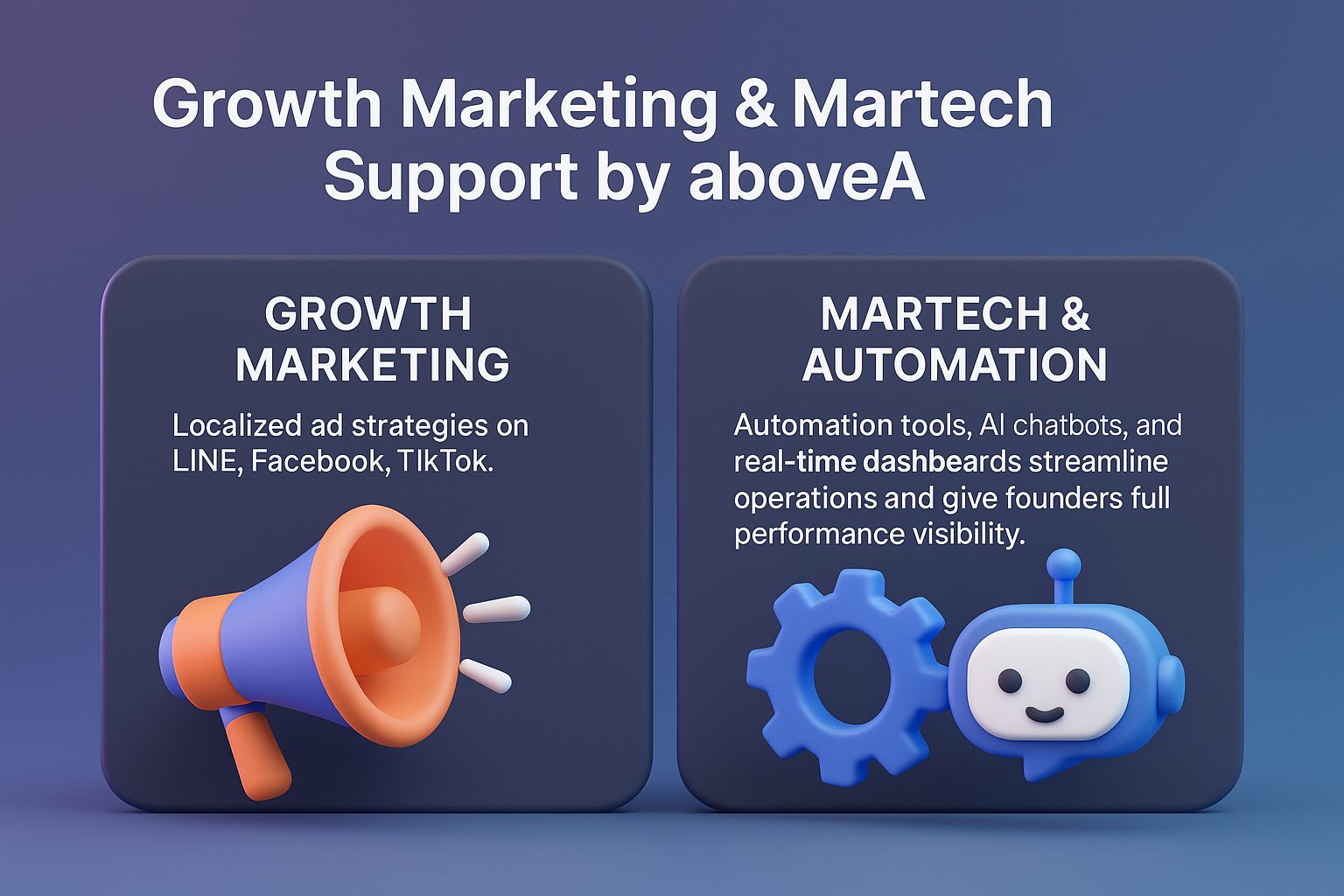
A Partner for Long-Term Growth
Unlike traditional agencies, aboveA works like an extension of your startup team. We align marketing with financial goals, test new strategies quickly, and support founders as they move from local traction to international scaling.
With the right strategy, Taiwan is one of the most cost-effective locations in Asia for building. With aboveA as your growth partner, you can turn careful budgeting into measurable success.
Conclusion
How much it costs to build a startup in Taiwan in 2025 depends on choices in registration, office space, hiring, marketing, and compliance. Compared with other Asian hubs, Taiwan offers lower salaries, affordable rent, and strong government support, making it one of the most cost-effective markets for entrepreneurs. Founders who plan carefully can start lean, adapt faster, and use available funding programs to extend their runway. With wise budgeting and the right growth strategies, Taiwan offers both a cost advantage and a strategic location for scaling across Asia.
Frequently Asked Questions
How much does it cost to register a company in Taiwan?
Registering a company typically costs between NT$60,000 and NT$100,000, which includes filing fees, minimum capital requirements, company seal, translations, and accountant services. Foreign founders may incur additional expenses due to visa or bilingual support requirements.
Are office spaces expensive for startups in Taiwan?
Office costs vary. A virtual office starts at NT$3,000 per month, while co-working spaces cost between NT$6,000 and NT$ 12,000 per desk. In contrast, traditional offices in Taipei range from NT$60,000 to NT$100,000 per month.
What are average salaries for startup employees in Taiwan?
In 2025, entry-level salaries range NT$30,000–40,000 monthly, skilled professionals earn NT$45,000–70,000, while senior staff expect NT$80,000–120,000. Employers also contribute an extra 10–15% toward insurance and pension costs.
Is Taiwan cheaper than Singapore or Hong Kong for startups?
Yes, Taiwan is significantly cheaper. Office rent is two to four times lower, salaries average US$2,200–2,800 per month, and marketing campaigns cost a fraction compared to Singapore or Hong Kong.

